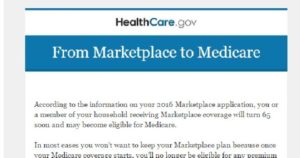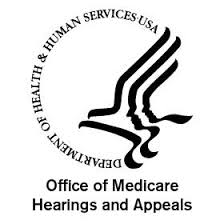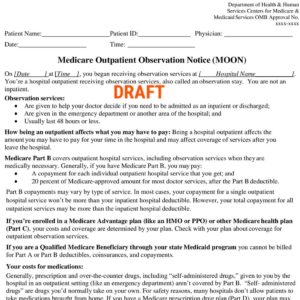By Susan Jaffe | Kaiser Health News | October 14 2016 | This KHN story also ran in ![]()
Ever since the Affordable Care Act’s health insurance marketplaces opened for business in 2014, the Obama administration has worked hard to make sure Americans sign up. Yet officials now are telling some older people they might have too much insurance and they should cance l their marketplace policies.
l their marketplace policies.
The federal Centers for Medicare & Medicaid Services is targeting two groups. First the agency is sending emails each month to about 15,000 people with subsidized marketplace coverage. The messages arrive a few weeks before their 6
5th birthday, which is also the age most people become eligible for Medicare. The email reminders will go to enrollees in the 38 states that use the federal marketplace.
“In most cases you won’t want to keep your Marketplace plan because once your Medicare coverage starts, you’ll no longer be eligible for any premium tax credits or other cost savings you may be getting for your Marketplace plan,” the notice says. “To avoid an unwanted overlap in Marketplace and Medicare coverage … tell us you want to end your Marketplace plan.”
…Beneficiaries shoulder a lot of responsibility, even though there is no requirement they all be told what to do and when. Only the individual can terminate marketplace coverage when he or she becomes eligible for Medicare. Inaction means paying back any coverage subsidies received after they should have joined Medicare. [Continued in Kaiser Health News or The Washington Post]

 e she’d had individual coverage through Blue Cross Blue Shield when she became eligible for Medicare, the company automatically signed her up for its own Medicare Advantage plan after notifying her in a letter. Hanttula said she ignored all mail from insurers because she had chosen traditional Medicare.
e she’d had individual coverage through Blue Cross Blue Shield when she became eligible for Medicare, the company automatically signed her up for its own Medicare Advantage plan after notifying her in a letter. Hanttula said she ignored all mail from insurers because she had chosen traditional Medicare.


 was a response to complaints from Medicare patients who were surprised to learn that although they had spent a few days in the hospital, they were there for observation and were not admitted. Observation patients are considered too sick to go home yet not sick enough to be admitted. They may pay higher charges than admitted patients and do not qualify for Medicare’s nursing home coverage.
was a response to complaints from Medicare patients who were surprised to learn that although they had spent a few days in the hospital, they were there for observation and were not admitted. Observation patients are considered too sick to go home yet not sick enough to be admitted. They may pay higher charges than admitted patients and do not qualify for Medicare’s nursing home coverage.